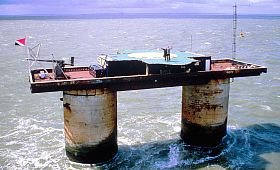
A micronation is a political entity whose representatives claim that they belong to an independent nation or sovereign state, but which lacks legal recognition by any sovereign state. Micronations are classified separately from de facto states and quasi-states; they are also not considered to be autonomous or self-governing as they lack the legal basis in international law for their existence. The activities of micronations are almost always trivial enough to be ignored rather than disputed by the established nations whose territory they claim—referred to in micronationalism as macronations. Several micronations have issued coins, flags, postage stamps, passports, medals and other state-related items, some as a source of revenue. Motivations for the creation of micronations include theoretical experimentation, political protest, artistic expression, personal entertainment and the conduct of criminal activity. The study of micronationalism is known as micropatriology or micropatrology.
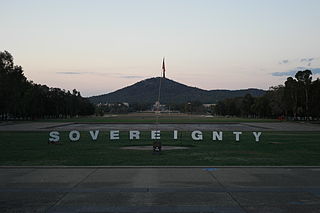
Australian Indigenous sovereignty, also recently termed Blak sovereignty, encompasses the various rights claimed by Aboriginal and Torres Strait Islander peoples within Australia. Such rights are said to derive from Indigenous peoples' occupation and ownership of Australia prior to colonisation and through their continuing spiritual connection to land. Indigenous sovereignty is not recognised in the Australian Constitution or under Australian law.

The Grand Duchy of Avram is a micronation founded in the early 1980s by Tasmanian John Charlton Rudge, who styles himself the "Grand Duke of Avram".
The Sovereign State of Aeterna Lucina, was an Australian micronation. It was founded in 1978, and continued until the death of its founder.

Micronations: The Lonely Planet Guide to Home-Made Nations is an Australian gazetteer about micronations, published in September 2006 by Lonely Planet. It was written by John Ryan, George Dunford and Simon Sellars. Self-described as a humorous guidebook and written in a light-hearted tone, the book's profile of micronations offers information on their flags, leaders, currencies, maps and other facts. It was re-subtitled Guide to Self-Proclaimed Nations in later publications.
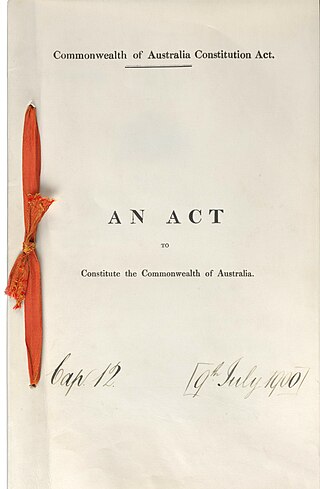
The Constitution of Australia is the fundamental law that governs the political structure of Australia. It is a written constitution, that establishes the country as a federation under a constitutional monarchy governed with a parliamentary system. Its eight chapters sets down the structure and powers of the three constituent parts of the federal level of government: the Parliament, the Executive Government and the Judicature.

The Grand Duchy of Flandrensis is a micronation with claims over some territories of Antarctica, which was founded in 2008 by the Belgian Niels Vermeersch. Flandrensis is not recognised by any country or government, nor is it their intention to get diplomatic recognition. Since 2021 the micronation is registered in Belgium as the environmental non-profit organization “vzw Groothertogdom Flandrensis”.
MicroCon is a biennial summit or conference of micronationalists held in every other year since April 11, 2015. The event was created by Kevin Baugh of the Republic of Molossia, and every summit since has been hosted by a different micronation. MicroCon is a significant event in the micronational community, serving as a venue for exchanging ideas between micronationalists. The event has also been compared to the micronational equivalent of a session of the United Nations General Assembly. The largest edition, MicroCon 2019 in Hamilton, Ontario, Canada, had 113 attendees from 43 micronations. MicroCon 2023 was the first edition to consist of two separate events: an American summit in Joliet, Illinois, and a European summit in Ypres, Belgium.
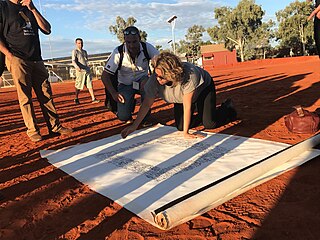
The Uluru Statement from the Heart is a 2017 petition to the people of Australia, written and endorsed by the Australian Aboriginal and Torres Strait Islander leaders selected as delegates to the First Nations National Constitutional Convention. The document calls for substantive constitutional change and structural reform through the creation of two new institutions; a constitutionally protected First Nations Voice and a Makarrata Commission, to oversee agreement-making and truth-telling between governments and First Nations. Such reforms should be implemented, it is argued, both in recognition of the continuing sovereignty of Indigenous peoples and to address structural power differences that has led to severe disparities between Indigenous and non-Indigenous Australians. These reforms can be summarised as Voice, Treaty and Truth.

The Aboriginal and Torres Strait Islander Voice, also known as the Indigenous Voice to Parliament, the First Nations Voice or simply the Voice, was a proposed Australian federal advisory body to comprise Aboriginal and Torres Strait Islander people, to represent the views of Indigenous communities.

The Principality of Snake Hill, also known simply as Snake Hill is a self-proclaimed independent sovereign state (micronation), located near Mudgee in New South Wales, Australia. Snake Hill has roughly hundreds of citizens, and claims land the size of Monaco. Snake Hill claimed independence on 2 September 2003, and Princess Paula claimed it was a right to secede, citing "The U.S., as you well know, seceded from England in 1776, It’s a remedial right, a last resort."

The Antarctic Micronational Union (AMU) is an intermicronational organization that aims to regulate micronational claims in Antarctica. The purpose of the AMU is to protect the claims of its members against other claimants.
Constitutional recognition of Indigenous Australians refers to various proposals for changes to the Australian Constitution to recognise Indigenous Australians in the document. Various proposals have been suggested to symbolically recognise the special place Indigenous Australians have as the first peoples of Australia, along with substantial changes, such as prohibitions on racial discrimination, the protection of languages and the addition of new institutions. In 2017, the Uluru Statement from the Heart was released by Indigenous leaders, which called for the establishment of an Indigenous Voice to Parliament as their preferred form of recognition. When submitted to a national referendum in 2023 by the Albanese government, the proposal was heavily defeated.
The Principality of Aigues-Mortes is a micronation that claims the city of Aigues-Mortes. It is not recognised by any country or government.

MicroWiki is a free online encyclopedia about micronations launched in 2005. It has since become the principal way in which Internet users document micronational matters, as most do not meet Wikipedia's notability requirements. It is maintained by volunteers using the same MediaWiki software as Wikipedia. MicroWiki describes itself as "the largest encyclopedia about micronations".

Micronations and the Search for Sovereignty is a 2021 book by Australian constitutional law specialists Harry Hobbs and George Williams about micronations and their legal status. Written from an academic perspective, it is one of few works on micronational movements and the earliest-published book to focus largely on the legal aspect of micronations. The book concerns the definition of statehood, the place of micronations within international law, people's motivations for declaring them, the micronational community and the ways by which such entities mimic sovereign states. In 2022 Hobbs and Williams published a book for a broader audience, How to Rule Your Own Country: The Weird and Wonderful World of Micronations.

How to Rule Your Own Country: The Weird and Wonderful World of Micronations is a 2022 book by Australian lawyers and legal academics Harry Hobbs and George Williams about micronationalism—exploring several micronations and their motivations for declaring independence. The book gives an overview on the topic of micronationalism and explores numerous micronations, extant and defunct, as well as their motivations for declaring sovereignty. An overarching theme is the disproportionate number of micronations located within Australia. How to Rule Your Own Country is a follow-up to Hobbs' and Williams' more academic 2021 work Micronations and the Search for Sovereignty.
The Republic of Slowjamastan is a micronation in Imperial County, Southern California, United States. Founded on December 1, 2021, by slow jam DJ Randy Williams, Slowjamastan is located on an empty plot of desert land along State Route 78. A micronation is a political entity that claims independence and mimics acts of sovereignty as if it were a sovereign state, but lacks any legal recognition. Although Slowjamastan has no structures, located on the plot of land is a large border sign by the highway, a border control post and an open desk that serves as the Williams' office—the self-proclaimed sultan of the micronation. He founded Slowjamastan following a visit to Molossia, another micronation located in Dayton, Nevada, in August 2021, and purchased the plot of land in October for US$19,000.
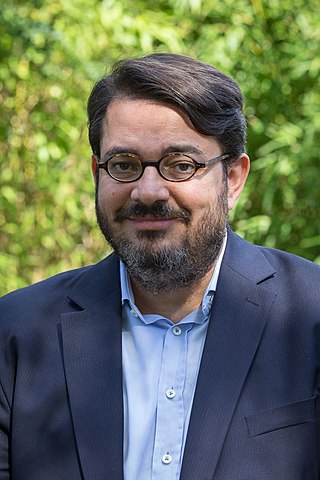
Although the academic study of micronations—known as micropatriology—is limited, there have nevertheless been a number of published works on the subject. The following is a list documenting these written works. This list does not contain works wherein micronationalism is the secondary theme, such as reference works which contain or make references to micronations and books about individual micronations.














